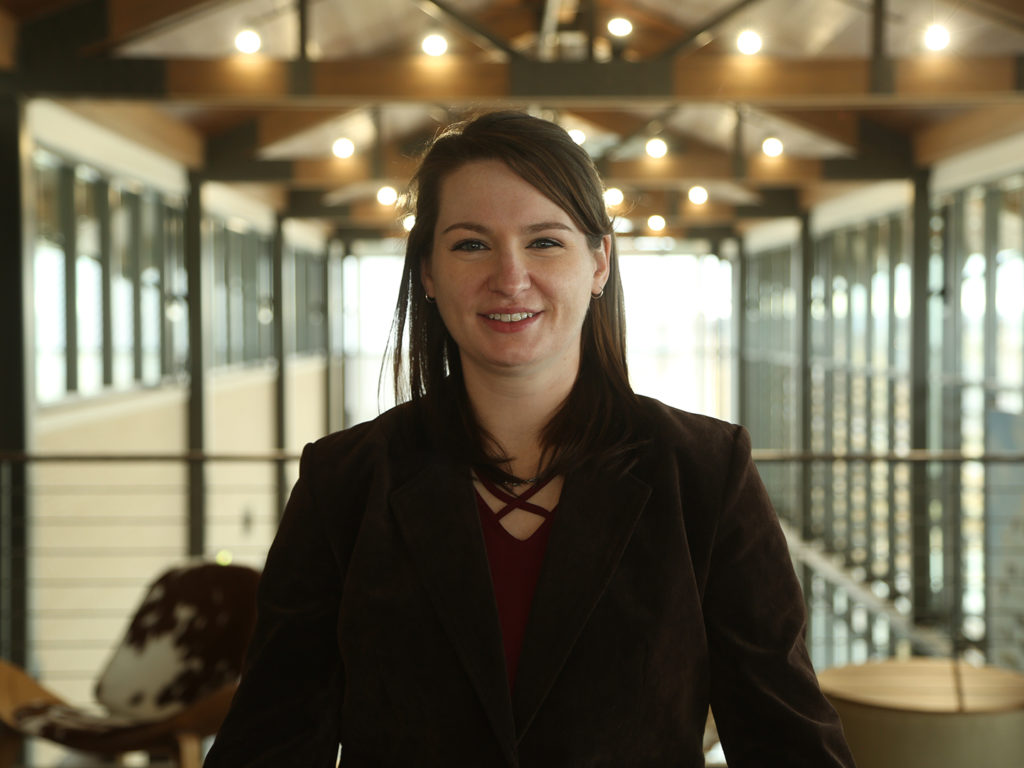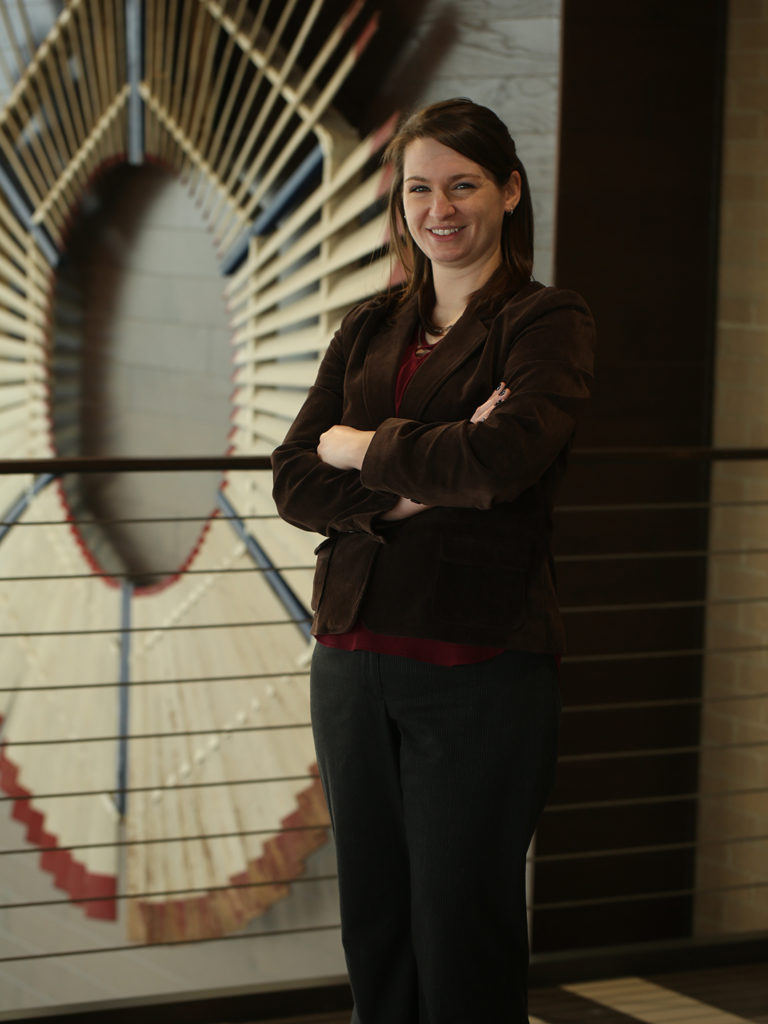Beef Cattle Expert Joins Texas A&M VERO Team In Texas Panhandle
Story by Margaret Preigh, CVMBS Communications

Dr. Jenna Funk, the newest clinical assistant professor at the Texas A&M College of Veterinary Medicine & Biomedical Sciences’ (CVMBS) Veterinary Education, Research, & Outreach (VERO) program, found her herd early in life.
“I’ve wanted to be a veterinarian for as long as I can remember. I’ve never not wanted to be a veterinarian,” she said. “By the time I got to my first year of vet school, when I did my feedlot internship, I knew this was where I wanted to be. I stepped onto my first feedlot and just immediately felt comfortable.”
After receiving her Doctor of Veterinary Medicine (DVM) degree from Iowa State University in 2015, Funk spent a year in a private cow-calf practice in Nebraska before returning to Iowa State University to complete a beef cattle residency and master’s degree program. In January of 2019, she moved to Ontario, Canada, to join a private cattle practice.
Now, the beef cattle production medicine specialist has returned stateside to teach CVMBS students at VERO, on the West Texas A&M University campus, about beef cattle production through hands-on instruction with local producers in the Texas Panhandle.
“I’m really excited to be in Texas, in the heart of the beef cattle industry. The big commercial feedlots are what I really fell in love with,” Funk said. “I’ve been working in smaller confinement yards for a long time at this point, so getting back to big, open dirt yards is really exciting.”
Dr. Susan Eades, head of the CVMBS’ Large Animal Clinical Sciences (VLCS) Department, said Funk is a welcomed addition to the VERO team and that Funk’s skills and experience will benefit both students and the Texas Panhandle region tremendously.
“Not only is Dr. Funk an extremely competent beef cattle veterinarian, but she truly loves teaching students,” Eades said. “There are more than 2.5 million cattle within the region and more than 25% of all beef eaten in the U.S. come from within a two-hour drive of VERO, so the opportunities for Dr. Funk at VERO are endless. We are very happy she’s chosen to join us.”
Dr. Dee Griffin, VERO director and a mentor of Funk’s since her first year of veterinary school, said he’s excited by what Funk will bring to VERO in teaching students in the CVMBS’ new 2+2 DVM program, as well as in leading fourth-year veterinary students on clinical rotations through feedlots and within rural practices in the region VERO serves.

“I met Jenna when she enrolled in a feeder cattle veterinary clinical skills and management summer educational program. Jenna spent 60-80 hours weekly learning every task on a 50,000-head feedyard—from doctoring cattle, ultrasound pregnancy exams, cleaning water tanks, driving heavy equipment, and loading and unloading cattle trucks,” Griffin said. “She did such an amazing job and demonstrated tremendous work ethic and attitude.”
Funks’ relationship with Griffin and the opportunities presented by the 2+2 program made her equally eager to apply at VERO.
“What really appealed to me was VERO’s drive to put students on the farms and in real-life situations, the cooperation they have with the mixed animal practices, the relationships they’re building with the commercial feedlots and dairies, and their desire to give the students real-world experience in what they’re going to run into when they get out into practice,” Funk said, adding that the intricacies of large feed operations can’t be replicated in a classroom and that exposure to these settings is key to preparing students for their first year in practice.
The opportunities provided by joining the VERO program early-on also appeal to Funk, who says she looks forward to helping build a program that students are proud to be a part of.
Internship opportunities hold particular significance to Funk, whose internship on a feedlot early in her veterinary schooling was very formative to her career.
“Internship programs are very much near and dear to my heart because I know that that’s the reason that I’m a feedlot vet today,” she said. “Building these programs and bringing students in that don’t necessarily have a lot of experience gives them these opportunities but with a bit of a safety net.”
Attracting new students to rural and large animal veterinary medicine is an important task, as demand for these specialties often exceeds supply. Funk hopes that VERO will draw more veterinary students to rural practice to help meet the needs of small communities and ensure our nation has a safe and secure food supply.
“The key to rural practice is understanding rural life. For students who have not been to small towns before, it’s an adjustment,” she said. “It’s understanding that being 60 miles from the nearest Walmart isn’t as big of a deal as you think. Everything is scary until you do it or you’re a part of it. It’s important to show students rural practices and get them into the rural communities to show how great the people out here are.”
Funk also hopes to draw more women into the field. Even though about 80% of veterinary students are women, they make up only a third of large animal veterinarians.
She credits Dr. Jen Schleining, a VLCS clinical associate professor at the CVMBS, as being an inspiration and mentor to her as a female veterinarian in a male-dominated sector. Funk hopes that she can offer similar support to other young women looking to pursue large animal rural medicine.
“There are rough spots. There have been people who have said, ‘No, I don’t want the lady vet. I want the guy,’” Funk said. “But as long as you show up, know your stuff, and you’re confident about what you know, they’ll accept you.”
For now, Funk seems to have little apprehension about returning to her feedlot roots in the new setting of VERO’s home in Canyon, Texas.
“Ranchers and producers respect when you go out there and sweat just as much as they do, when you’re covered in just as much manure and mud by the end of the day,” she said. “I’ve always felt really comfortable around the farmers and ranchers and cowboys. And then the cattle themselves, I understand them. It feels like it’s where I’m supposed to be; I’ve never felt like I should be anywhere else.”
###
For more information about the Texas A&M College of Veterinary Medicine & Biomedical Sciences, please visit our website at vetmed.tamu.edu or join us on Facebook, Instagram, and Twitter.
Contact Information: Jennifer Gauntt, Director of CVMBS Communications, Texas A&M College of Veterinary Medicine & Biomedical Sciences, jgauntt@cvm.tamu.edu, 979-862-4216; Chip Chandler, senior communications specialist, WT, cchandler@wtamu.edu, 806-651-2124


